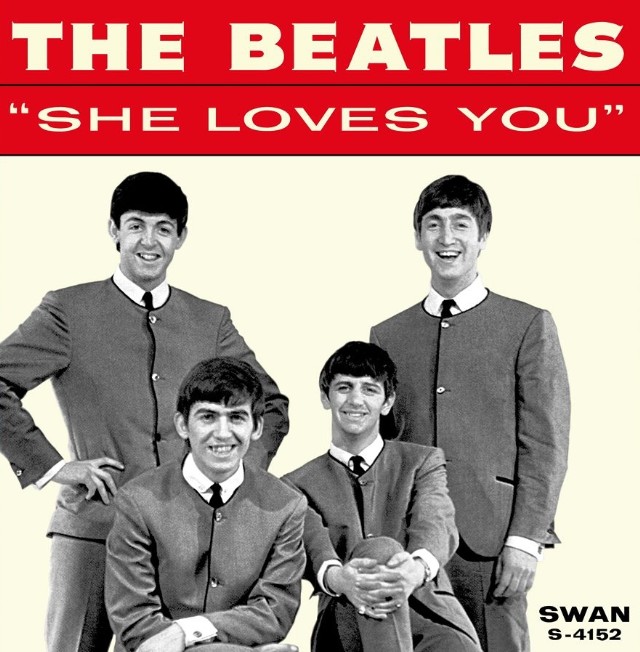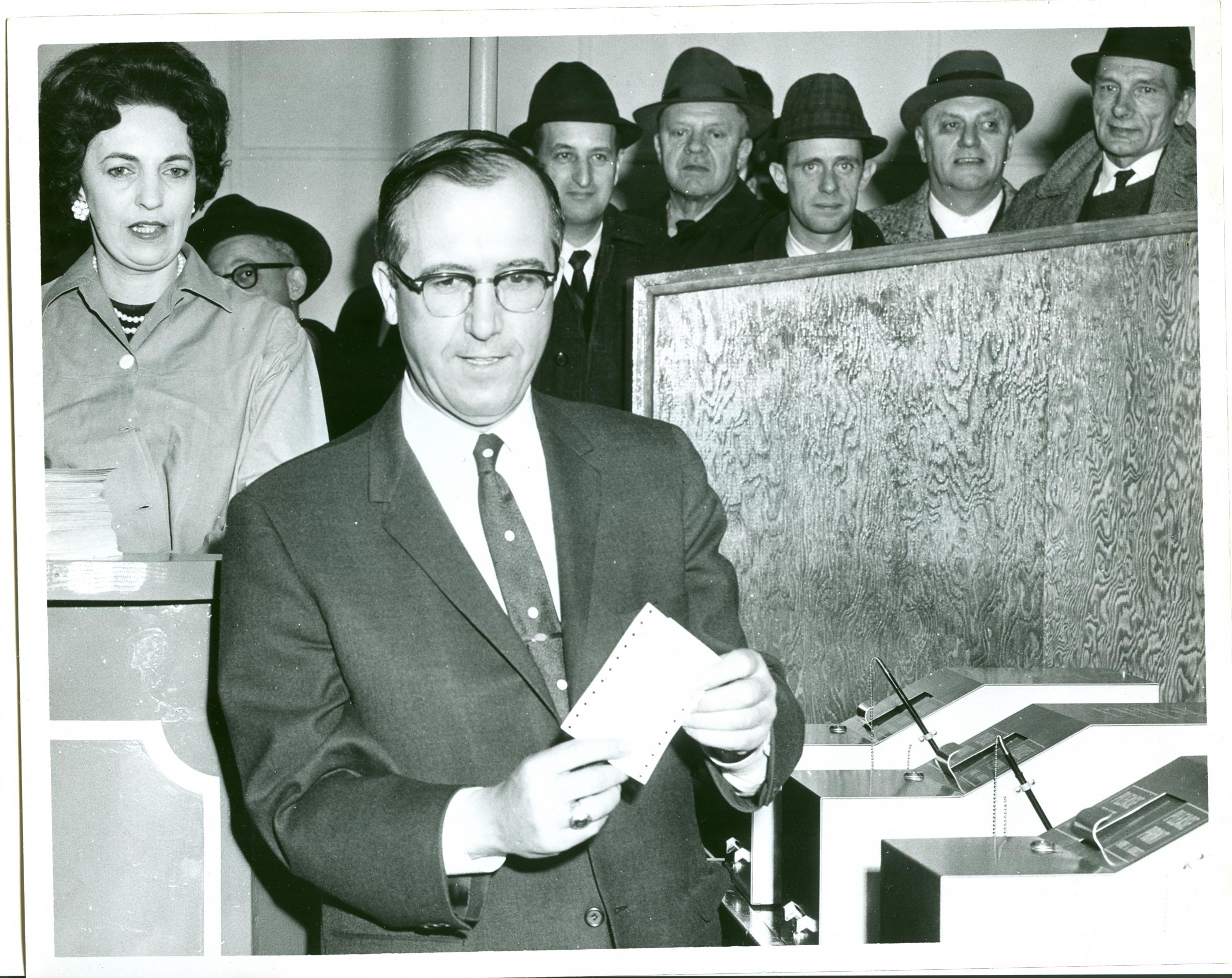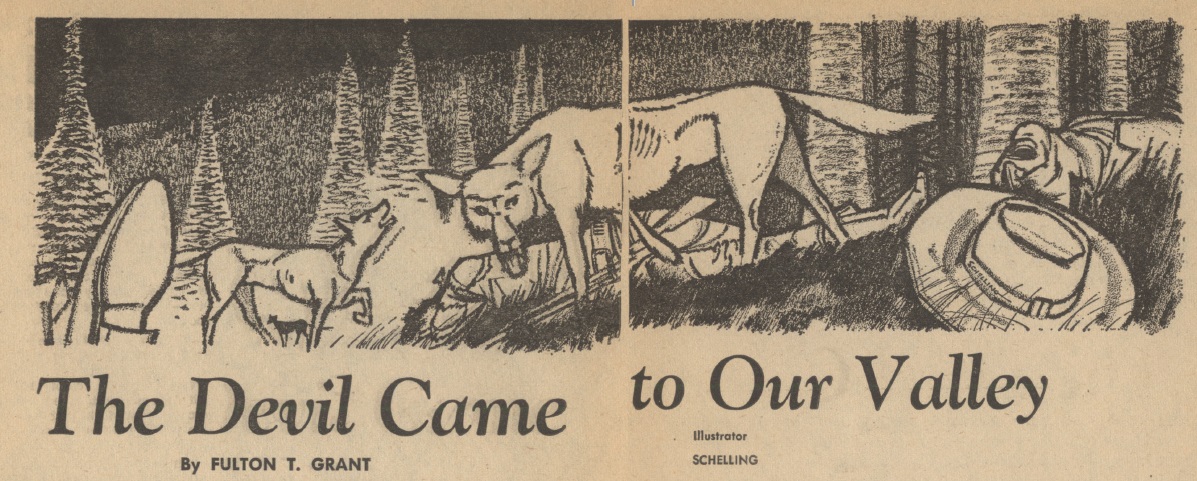
by Victoria Silverwolf
Things that Came
Judging by the unstoppable juggernaut known as the Beatles, it would seem that not much has changed in the last month or so. Following the massive success of I Want to Hold Your Hand, which remained Number One in the USA for all of February and half of March, the four Liverpudlians had another smash hit. Perhaps best known for its frequent use of the phrase Yeah, Yeah, Yeah, the upbeat rock ditty She Loves You is currently the most popular song on this side of the Atlantic.

Will they beat Elvis?
Of course, new things continue to happen. The Ford Motor Company just produced a snazzy sports car called the Mustang.

It even matches that lady's outfit.
Voters in New Hampshire overwhelmingly approved the first legal state lottery in the nation since 1895. Governor John W. King bought the first ticket.

He'll look even happier if he wins.
The Issue at Hand
Similarly, the latest issue of Fantastic offers a touch of the new, along with a lot of things that will seem familiar.

by Frank Bruno
Centipedes of Space, by Daniel F. Galouye
Here's a story filled with the traditional elements of space opera. The main character is an Admiral in command of a fleet of two thousand starships. (Writers always seem to assume that military space vessels will resemble Navy ships. I suppose it’s the romance of the high seas.) An enemy armada threatens a group of inhabited worlds. To reach the area in time to stop the attack, he must guide his flotilla through a dangerous region of space. Few ships have survived such a journey.
Bizarre creatures, from giant worms to dinosaurs, attack the warships. Even stranger things happen, such as a naked woman suddenly appearing on the Admiral's flagship. The phenomena can't be explained as hallucinations, because ships are destroyed and men die. (There are no women in this future Space Navy.) Will anyone survive to stop the invasion?

Despite some originality, decent writing, and good characterization, this is a typical space adventure. There's an explanation for the weird happenings, but it's not particularly convincing or interesting.
Three stars.
The Dunstable Horror, by Arthur Pendragon

(Based on what little I know about the legends of Camelot, I presume the author is using a pseudonym. Further evidence for this is the fact that the narrator of this tale of eldritch horror is named Grail.)
In 1920, a British researcher arrives in New England to investigate an Indian burial ground. He meets the owner of a lumber mill. The fellow wants to look at the area also, as a possible source of wood. Complicating matters is a strange blue light seen by his workers. If that isn't spooky enough, the bodies of drowned animals keep showing up in the local river. It won't surprise you to find out that this involves the grave of an Indian sorcerer.
There aren't many surprises in this imitation of Lovecraft. Nitpickers will notice that the phrase comic book appears, although those didn't exist in 1920.
Two stars.
A Ritual for Souls, by Albert Teichner

We get a break from old-fashioned storytelling with this offbeat yarn. Very peculiar aliens arrive on a depopulated Earth. They take on human form in order to study the extinct species, which they think of as soulless. They decide to imitate human behavior as well. This turns out to be a bad idea.
I'm not sure what the author is trying to say in this dark satire of humanity's foibles. It seems to be, at least partly, an attack on the philosophy of behaviorism. At least it's different.
Two stars.
The Rule of Names, by Ursula K. LeGuin
Back to the familiar, with a tale of wizards and dragons. The only magician on a small island is a middle-aged man, short and fat, without much skill. A seafarer arrives, who also happens to be an enchanter. It seems that a wizard made off with a dragon's treasure some time ago. The new arrival thinks the local magician has it. He's in for a surprise.
Deftly written, this light fantasy is reasonably entertaining, but the twist ending is predictable. Particularly notable is the author's creation of an interesting fantasy world consisting only of islands. Perhaps she'll make further use of it in the future.
Three stars.
The Devil Came to Our Valley, by Fulton T. Grant

This month's Fantasy Classic comes from the March 1937 issue of Bluebook. I hesitate to call it a Classic, and it definitely isn't Fantasy. The introduction by Sam Moskowitz tries to convince me that it's part of the Lost Race subgenre, but I don't buy it. The isolated group of people in the story are very real. Known as the Jackson Whites, they inhabit a mountainous area of New Jersey. Their ancestry isn't clear, although the author presumes they're a mixture of Indian, African, and European. Whatever the truth may be, there is nothing supernatural about these folks, in reality or in fiction.
An orphaned girl is not one of the Jackson Whites, but is raised among them. She falls in love with a young man of the people. The community thinks of them as married, without the need for ceremony. A wealthy man shows up in a nearby town. The woman is drawn to the luxuries he can provide. This leads to murder, a dramatic courtroom trial, and a self-sacrificing gesture by the woman.

This tragic tale walks a thin line between genuine emotion and melodrama, often falling on the wrong side. There's plenty of local color, although I can't vouch for how accurate it is. Some of the narration is beautifully written, some of it is overwritten. The author appears to feel great sympathy for the Jackson Whites, but also portrays them as ignorant and lawless. Although not speculative fiction in any sense of the word, the background is exotic enough to appeal to readers of such.
Three stars.
Summing Up
Without any outstanding stories, this is a disappointing issue. Neither the traditional tales nor the one unusual piece offer much excitement, although some are enjoyable enough. I guess it goes to show that, however much we might hunger for something new, change isn't always an improvement.
[Come join us at Portal 55, Galactic Journey's real-time lounge! Talk about your favorite SFF, chat with the Traveler and co., relax, sit a spell…]

![[March 23, 1964] What's New? Not Much (April 1964 <i>Fantastic</i>)](https://galacticjourney.org/wp-content/uploads/2019/03/640323cover-496x372.jpg)

![[February 23, 1964] Songs of Innocence and of Experience (March 1964 <i>Fantastic</i>)](https://galacticjourney.org/wp-content/uploads/2019/02/640223cover-672x372.jpg)








